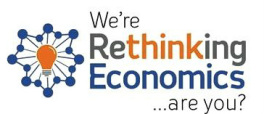From Lars Syll Nowadays there is almost no place whatsoever in economics education for courses in the history of economic thought and economic methodology. This is deeply worrying. A science that doesn’t self-reflect and asks important methodological and science-theoretical questions about the own activity, is a science in dire straits. How did we end up in this sad state? Philip Mirowski gives the following answer: After a brief flirtation in the 1960s and 1970s, the grandees of the economics profession took it upon themselves to express openly their disdain and revulsion for the types of self-reflection practiced by ‘methodologists’ and historians of economics, and to go out of their way to prevent those so inclined from occupying any tenured foothold in reputable economics
Topics:
Lars Pålsson Syll considers the following as important: Uncategorized
This could be interesting, too:
tom writes The Ukraine war and Europe’s deepening march of folly
Stavros Mavroudeas writes CfP of Marxist Macroeconomic Modelling workgroup – 18th WAPE Forum, Istanbul August 6-8, 2025
Lars Pålsson Syll writes The pretence-of-knowledge syndrome
Dean Baker writes Crypto and Donald Trump’s strategic baseball card reserve
from Lars Syll
Nowadays there is almost no place whatsoever in economics education for courses in the history of economic thought and economic methodology.
This is deeply worrying.
A science that doesn’t self-reflect and asks important methodological and science-theoretical questions about the own activity, is a science in dire straits.
How did we end up in this sad state?
Philip Mirowski gives the following answer:
After a brief flirtation in the 1960s and 1970s, the grandees of the economics profession took it upon themselves to express openly their disdain and revulsion for the types of self-reflection practiced by ‘methodologists’ and historians of economics, and to go out of their way to prevent those so inclined from occupying any tenured foothold in reputable economics departments. It was perhaps no coincidence that history and philosophy were the areas where one found the greatest concentrations of skeptics concerning the shape and substance of the post-war American economic orthodoxy. High-ranking economics journals, such as the American Economic Review, the Quarterly Journal of Economics and the Journal of Political Economy, declared that they would cease publication of any articles whatsoever in the area, after a prior history of acceptance.
Once this policy was put in place, and then algorithmic journal rankings were used to deny hiring and promotion at the commanding heights of economics to those with methodological leanings. Consequently, the grey-beards summarily expelled both philosophy and history from the graduate economics curriculum; and then, they chased it out of the undergraduate curriculum as well. This latter exile was the bitterest, if only because many undergraduates often want to ask why the profession believes what it does, and hear others debate the answers, since their own allegiances are still in the process of being formed. The rationale tendered to repress this demand was that the students needed still more mathematics preparation, more statistics and more tutelage in ‘theory’, which meant in practice a boot camp regimen consisting of endless working of problem sets, problem sets and more problem sets, until the poor tyros were so dizzy they did not have the spunk left to interrogate the masses of journal articles they had struggled to absorb.
Methodology is about how we do economics, how we evaluate theories, models and arguments. To know and think about methodology is important for every economist. Without methodological awareness it’s really impossible to understand what you are doing and whyyou’re doing it. Dismissing methodology is dismissing a necessary and vital part of science.
Already back in 1991, a commission chaired by Anne Krueger and including people like Kenneth Arrow, Edward Leamer, and Joseph Stiglitz, reported from own experience “that it is an underemphasis on the ‘linkages’ between tools, both theory and econometrics, and ‘real world problems’ that is the weakness of graduate education in economics,” and that both students and faculty sensed “the absence of facts, institutional information, data, real-world issues, applications, and policy problems.” And in conclusion, they wrote that “graduate programs may be turning out a generation with too many idiot savants skilled in technique but innocent of real economic issues.”
Not much is different today. Economics — and economics education — is still in dire need of a remake.
Twenty-five years ago, Phil Mirowski was invited to give a speech on themes from his book More Heat than Light at my economics department in Lund, Sweden. All the mainstream neoclassical professors were there. Their theories were totally mangled and no one — absolutely no one — had anything to say even remotely reminiscent of a defence. Being at a nonplus, one of them, in total desperation, finally asked: “But what shall we do then?”
 Yes indeed — what shall they do when their emperor has turned out to be naked?
Yes indeed — what shall they do when their emperor has turned out to be naked?
More and more young economics students want to see a real change in economics and the way it’s taught. They want something other than the same old mainstream neoclassical catechism. They don’t want to be force-fed with useless mainstream neoclassical theories and models. They have my full support!
